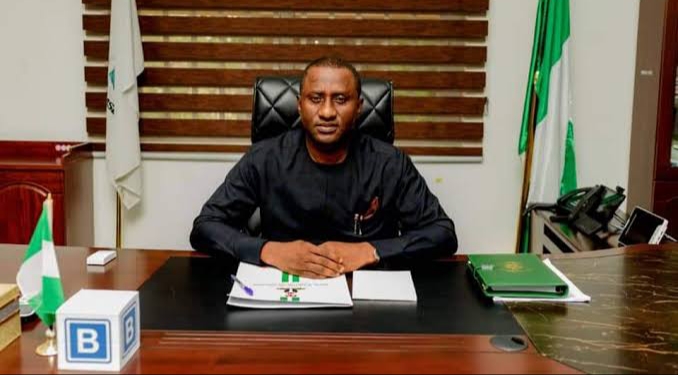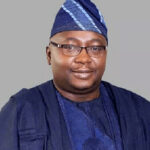In this interview, the Minister of State for Mines and Steel Development, Dr. Uchechukwu Sampson Ogah, speaks on the ministry’s revenue generation drive to boost the Gross Domestic Product (GDP) of the nation and on other issues.
Considering the present administration’s economic diversification to generate more revenue for the nation; how is your ministry ensuring host communities benefit directly from their products?
The 2007 Mineral Act was well anchored.
There are two basic things where the communities are involved.
You have the consent letter that gives you right to apply for a license.
When you now get into proper mining exploration and exploitation, you have what is called Community Development Agreement (CDA).
When you have this, you now see the must-do by the investors in the community: like providing pipe borne water, roads or scholarship or more.
If you don’t have CDA, you cannot commence mining in any community.
From time to time, it is reviewed to see if companies are following what they agreed upon.
The ministry has over the years granted about 20 licences for coal mining in Kogi and its environs.
The licences were to be used for power generation.
However, five years after, no coal power plant has been commissioned.
What is the ministry doing to ensure that the coal-to-power vision is fast tracked?
If you look at it, most of the coal assets were transferred to the Bureau for Public Enterprises (BPE) and they are aligning with most of the power companies.
There are a lot of agreements going on in terms of coal-to-power infrastructure which companies are being involved in.
These things are processes, and it’s going to take some time.
A lot is done in the ministry to ensure that within the shortest time we are going to have the coal-to-power agenda being brought to reality in the country.
We are collaborating with the Ministry of Power, and then with some of the investors, and we are working with the communities.
Some companies are already using it as source of power.
Nigeria’s salt import is soaring amid huge deposits in Benue, Cross River, Ebonyi, Abia, Taraba and Nasarawa states. The last time you were in Ebonyi, you spoke about the Presidential Initiative on Development of Salt and how the Federal Government wants to help develop salt in commercial quantity for the growth of the GDP. What is the update on this?
First of all, you have to do what is called proof of concept, exploration and analysis.
The consultants that are involved in this project have been commissioned.
A lot of analyses are being done to that effect.
I can assure you that when we are truly done, the importation of salt will be a thing of the past.
We have visited all the sites.
All the consultants have been paid and they are doing their work.
They have to know what kind of salt is in an area and what equipment will be fit to exploit/extract the salt.
As the Chairman of the Ministerial Committee on the Optimisation of Revenue from Mineral Resources; which is to ensure revenue from artisanal miners is recorded, what has been your discoveries so far and how have you been able to help optimise the revenue of the ministry?
We are looking at all the aggregates of the revenues that are due to the Ministry of Mines and Steel Development.
We want to increase the revenue source for the ministry by saying revenues from the Mining Cadastre, revenues from the Mining Inspectorate which has to do with exploitation are added with revenues from the artisanal mining sector.
We will aggregate them and we believe that by the end of the year we are going to surpass what we had last year.
Before we came in, we had N2.5bn, by the end of December, 2019, we were doing over N5bn.
We are sure of increasing that at the end of the year.
We are looking at how we can block all the leakages.
We are seeing that our mines officers on the field get to all the places where mining is being carried out to give us the real figures of what is going on.
Today, we have the Presidential Task Force on Mining, and they are going to move to the hinterlands to make sure we get the accurate data for assessment of the revenue due to the ministry.
I can assure you that the revenue from the ministry is increasing, if not for COVID-19, we should be talking of revenue above N10bn.
An alarm has been raised over the pollution of the Okollo stream and the Umabe and Okpokwu rivers, the only sources of water for several communities across four LGAs in Benue as a result of Dangote Group’s strip coal mining. Is the ministry aware of this and what is it doing to mitigate this?
Yes; we have the information and we have dispatched a team to the area to confirm.
What we do here is that in every state, we have environmental officers.
They are the first to raise alarm when environmental issues come up in any area.
When it came up, the ministry raised a team and they have visited there. And then the Dangote Group and Owukpa Consolidated Company are involved.
We are looking at the issues on ground and how they can be mitigated.
We are on top of the issue to see that the companies keep to the CDA.
It is a year in office for you and the senior Minister, Arch. Olamilekan Adegbite. How has the journey been?
It’s an awesome experience when you are coming from the private sector to the public sector.
It’s a joint mandate between me and the Minister, Arch. Olamilakan Adegbite, and the permanent secretary.
We are trying to meet the target given to us by the Federal Government.
The honourable minister is like an elder brother and together with the permanent secretary we are working as a team on how to move the mining sector forward.
There is corporation with the members of staff as well.
Within the period we have come, we have achieved a lot.
All the institutions under us have enhanced their performances.
We have been able to attract funds from the Mineral Sector Support for Economic Diversification Project (MinDIVER) and other interventions on how to ameliorate some of their problems.
We have been able to formalise most of the artisanal miners and grouped them into cooperatives.
Also, for the first time, the president is being presented a gold bar in our tenure.
We cannot say that our predecessors did not do well, but we are leveraging on what they have done.
There is always room for improvement and we are doing that, we are trying to make this sector the hope of every Nigerian as alternative to the oil and gas sector.
What is your projection for the next one year?
First, we have to thank God for taking us through the first one year and trust him to take us through the next one year.
As long as there is life, I can assure you that the next one year will be better as we are looking for areas to create more opportunities so as to move the industry forward.
Today, we are attracting a lot of investors.
One thing with the private sector is that if they see that they have credible people at the helm of affairs, investors want to come in.
A lot of them are calling because they want to be involved with mining in Nigeria.
When they call, they are amazed at the information we give them and they say they never knew this kind of information exist.
They say Nigeria is going to be a mining destination.
So, the future holds a lot for us.
For the first time, you see the way we are moving from state to state creating synergy between the state governments, miners and the local governments.
You can imagine that many governors never knew they have 13 per cent derivation.
We are telling them they have 13 per cent from minerals that are being mined from their states.
Governors are getting agitated to invest in the mining sector.
There is this understanding that the mining sector is the next solution to our oil sector.
The fourth industrial revolution is about minerals and the earlier we key into it and develop the mineral sector, the more we have opportunity to stand at the top.
The Nigerian Institute of Mining and Geosciences (NIMG), Jos, is presently the leading laboratory in the country for solid mineral analysis. NIMG by its mandate is aimed at bridging the existing gap between the requirements of the Nigerian mining industry and training currently being offered by conventional polytechnics in the country. How has NIMG been able to fulfill this mandate?
I can tell you authoritatively that NMIG has done very well in achieving its mandate in ensuring the training of exploration engineers and mineral experts who are skilled for the industry of today and tomorrow.
Their curriculum is quite different from the conventional universities or polytechnics because theirs is in the area of skills acquisition.
For instance, if you are in the area of gemstones, you are trained to be an expert in cutting stones and other skills.
They have been able to meet this standard in training people in the area of minerals processing, engineering and exploration expertise.

 Join Daily Trust WhatsApp Community For Quick Access To News and Happenings Around You.
Join Daily Trust WhatsApp Community For Quick Access To News and Happenings Around You.

